Filter by
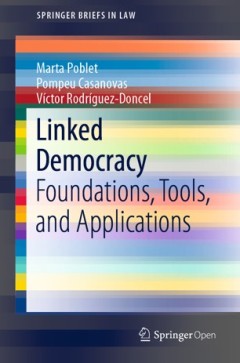
Linked democracy : foundations, tools, and applications
This open access book shows the factors linking information flow, social intelligence, rights management and modelling with epistemic democracy, offering licensed linked data along with information about the rights involved. This model of democracy for the web of data brings new challenges for the social organisation of knowledge, collective innovation, and the coordination of actions. Licensed…
- Edition
- -
- ISBN/ISSN
- 9783030133634
- Collation
- xv, 130p. : ill.
- Series Title
- -
- Call Number
- 343.0999 POB l
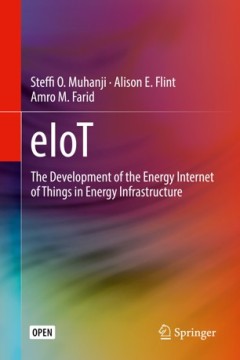
eIoT : the development of the energy internet of things in energy infrastructure
This open access book explores the collision between the sustainable energy transition and the Internet of Things (IoT). In that regard, this book’s arrival is timely. Not only is the Internet of Things for energy applications, herein called the energy Internet of Things (eIoT), rapidly developing but also the transition towards sustainable energy to abate global climate is very much at the f…
- Edition
- -
- ISBN/ISSN
- 9783030104276
- Collation
- xxviii, 160p. : ill
- Series Title
- -
- Call Number
- 333.79 MUH e
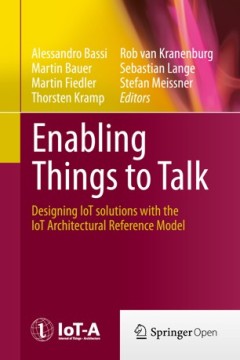
Enabling things to talk : designing IoT solutions with the IoT architectural …
The Internet of Things (IoT) is an emerging network superstructure that will connect physical resources and actual users. It will support an ecosystem of smart applications and services bringing hyper-connectivity to our society by using augmented and rich interfaces. Whereas in the beginning IoT referred to the advent of barcodes and Radio Frequency Identification (RFID), which helped to auto…
- Edition
- -
- ISBN/ISSN
- 9783642404030
- Collation
- x, 349p. : ill.
- Series Title
- -
- Call Number
- 004.678 ENA e
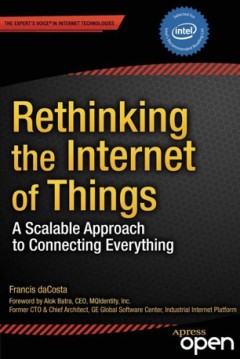
Rethinking the Internet of things : a scalable approach to connecting everything
Apress is proud to announce that Rethinking the Internet of Things was a 2014 Jolt Award Finalist, the highest honor for a programming book. And the amazing part is that there is no code in the book. Over the next decade, most devices connected to the Internet will not be used by people in the familiar way that personal computers, tablets and smart phones are. Billions of interconnected devi…
- Edition
- -
- ISBN/ISSN
- 9781430257417
- Collation
- xxvi, 192p. : ill.
- Series Title
- -
- Call Number
- 004 DAC r

Embedded Firmware solutions : development best practices for the Internet of …
Embedded Firmware Solutions is the perfect introduction and daily-use field guide--for the thousands of firmware designers, hardware engineers, architects, managers, and developers--to Intel’s new firmware direction (including Quark coverage), showing how to integrate Intel® Architecture designs into their plans. Featuring hands-on examples and exercises using Open Source codebases, like …
- Edition
- -
- ISBN/ISSN
- 9781484200704
- Collation
- xxiii, 224p. : ill.
- Series Title
- -
- Call Number
- 005.3 EMB e

Media and education in the digital age : concepts, assessments, subversion
This book is an invitation to informed and critical participation in the current debate on the role of digital technology in education and a comprehensive introduction to the most relevant issues in this debate. After an early wave of enthusiasm about the emancipative opportunities of the digital «revolution» in education, recent contributions invite caution, if not scepticism. This collectio…
- Edition
- -
- ISBN/ISSN
- 9783653044379
- Collation
- -
- Series Title
- -
- Call Number
- 371.33 MED m

TransCoding: from "Highbrow Art" to participatory culture : social media - ar…
Between 2014 and 2017, the artistic research project "TransCoding – From 'Highbrow Art' to Participatory Culture" encouraged creative participation in multimedia art via social media. Based on the artworks that emerged from the project, Barbara Lüneburg investigates authorship, authority, motivational factors, and aesthetics in participatory art created with the help of web 2.0 technology. T…
- Edition
- -
- ISBN/ISSN
- 9783837641080
- Collation
- 200 pages : illustrations (chiefly color) ; 23 cm.
- Series Title
- -
- Call Number
- 006.7 LUN t
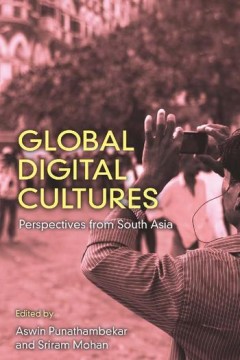
Global digital cultures : perspectives from South Asia
Digital media histories are part of a global network, and South Asia is a key nexus in shaping the trajectory of digital media in the twenty-first century. Digital platforms like Facebook, WhatsApp, and others are deeply embedded in the daily lives of millions of people around the world, shaping how people engage with others as kin, as citizens, and as consumers. Moving away from Anglo-Americ…
- Edition
- -
- ISBN/ISSN
- 9780472131402
- Collation
- viii, 317p. : ill.
- Series Title
- -
- Call Number
- 302.2310954

Traces of the old, uses of the new : the emergence of digital literary studies
Digital Humanities remains a contested, umbrella term covering many types of work in numerous disciplines, including literature, history, linguistics, classics, theater, performance studies, film, media studies, computer science, and information science. In Traces of the Old, Uses of the New: The Emergence of Digital Literary Studies, Amy Earhart stakes a claim for discipline-specific history…
- Edition
- -
- ISBN/ISSN
- 9780472072781
- Collation
- ix, 161p. : ill.
- Series Title
- -
- Call Number
- 802.85 EAR t

The hyperlinked society : questioning connections in the digital age
"Links" are among the most basic---and most unexamined---features of online life. Bringing together a prominent array of thinkers from industry and the academy, The Hyperlinked Society addresses a provocative series of questions about the ways in which hyperlinks organize behavior online. How do media producers' considerations of links change the way they approach their work, and how do these c…
- Edition
- -
- ISBN/ISSN
- 9780472070435
- Collation
- 319p. : ill.
- Series Title
- -
- Call Number
- 303.4833 HYP h
 Computer Science, Information & General Works
Computer Science, Information & General Works  Philosophy & Psychology
Philosophy & Psychology  Religion
Religion  Social Sciences
Social Sciences  Language
Language  Pure Science
Pure Science  Applied Sciences
Applied Sciences  Art & Recreation
Art & Recreation  Literature
Literature  History & Geography
History & Geography